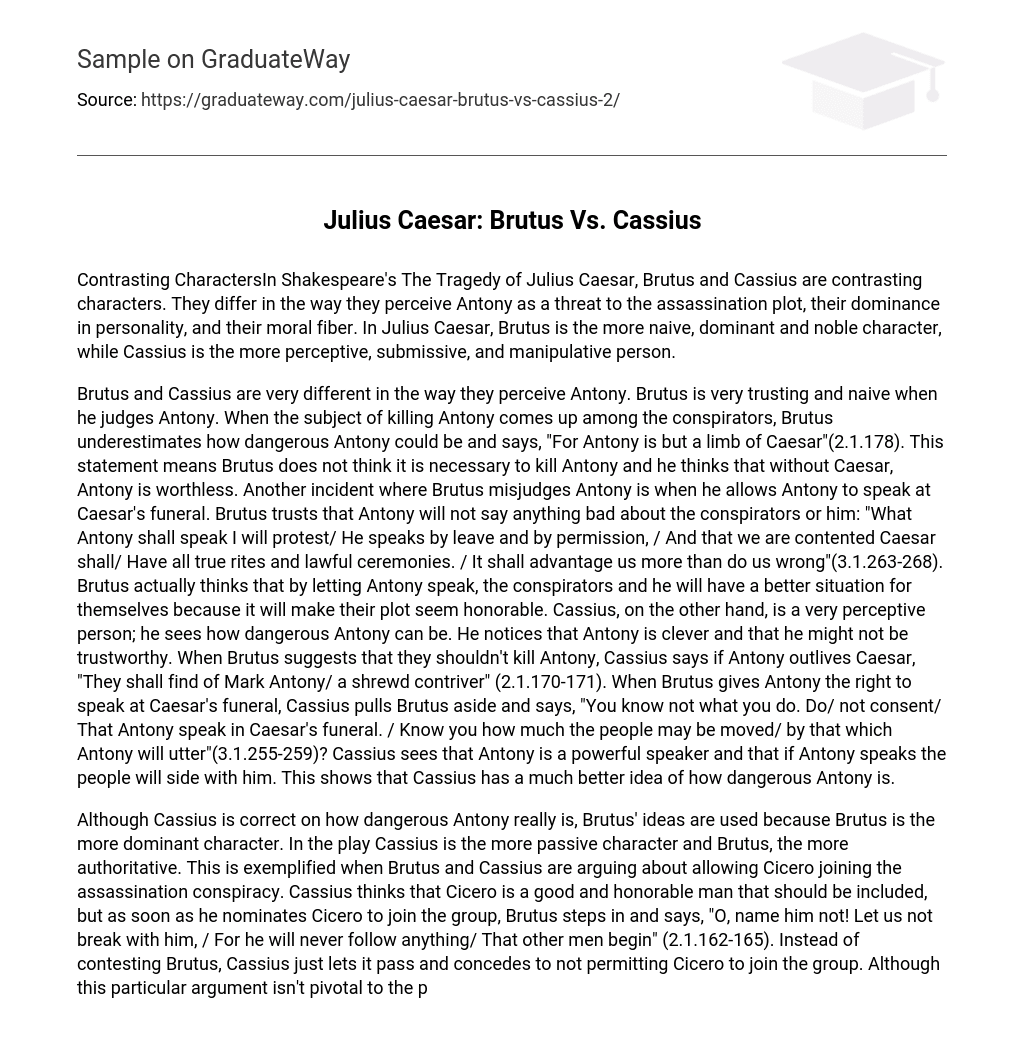Brutus and Cassius are contrasting characters in Shakespeare’s The Tragedy of Julius Caesar. They differ in their perception of Antony as a threat to the assassination plot, their dominance in personality, and their moral fiber. Brutus is portrayed as naive, dominant, and noble, while Cassius is depicted as perceptive, submissive, and manipulative.
Brutus and Cassius hold contrasting views on Antony’s character. Brutus displays trust and naivety in his assessment of Antony, believing that killing him is unnecessary as he considers him worthless without Caesar. This is evident when Brutus states, “For Antony is but a limb of Caesar” (2.1.178). Additionally, Brutus allows Antony to speak at Caesar’s funeral, relying on his assurance that Antony will not speak ill of the conspirators or himself. Brutus believes that this decision will work in their favor, stating, “It shall advantage us more than do us wrong” (3.1.263-268).
In contrast, Cassius possesses a keen perception of Antony’s potential danger. He recognizes Antony’s cleverness and questions his trustworthiness. When Brutus suggests sparing Antony’s life, Cassius warns, “They shall find of Mark Antony a shrewd contriver” (2.1.170-171). Cassius further expresses his concerns to Brutus when he grants Antony the opportunity to speak at Caesar’s funeral, emphasizing, “You know not what you do” (3.1.269).Cassius is wary of allowing Antony to address Caesar’s funeral, fearing the influential speaker may sway the crowd against them. Cassius recognizes Antony’s power to persuade and understands the potential danger he poses.
Despite acknowledging Cassius’ accurate assessment of Antony’s dangerous nature, Brutus’ dominant personality enables his ideas to be implemented. This contrast in character portrayal is evident during their disagreement over including Cicero in the assassination plot. While Cassius believes Cicero’s goodness and honorability make him a valuable addition, Brutus dismisses the suggestion, interrupting with the words, “O, name him not! Let us not break with him, for he will never follow anything that other men begin” (2.1.162-165). Rather than challenging Brutus, Cassius concedes and agrees to exclude Cicero. Although this argument may seem insignificant to the overall plot, it highlights how decision-making is controlled by Brutus. Another example showcasing Brutus’ dominance occurs when they discuss military strategies. Cassius proposes staying in their current location and allowing Octavius and Antony to exhaust themselves searching for them. He argues that it would be better if the enemy sought them out so they could deplete their resources and tire their soldiers: “Tis better that the enemy seek us; So shall he waste his means, and weary his soldiers” (4.3.228-229). Despite the validity of this idea, Brutus swiftly asserts his authority by stating that good reasons must give way to better ones: “Good reasons must by force give place by better” (4.3.233). He further justifies his reasoning – if they reach Philippi first, they will have an advantage over their adversaries.Despite Cassius presenting a solid argument, he does not challenge or contest Brutus’ decision.Due to Cassius submitting to Brutus despite having a superior plan,the armies suffer defeat leading ultimately towards their deathsDuring their argument, Cassius pleads with Brutus to end his life, convinced that Brutus had greater love for Caesar. Yet, Brutus rejects Cassius’ plea and urges him to regain composure, comparing their relationship to that of a parent and child. Once again, the text portrays Cassius as inferior to Brutus.
The main difference between Brutus and Cassius lies in their morality. Brutus is known for his nobility and unwavering dedication to his country. Even Cassius acknowledges this, stating, “Well, Brutus, thou art noble” (1.2.320). When Brutus shows his willingness to sacrifice himself for Rome, it further demonstrates his nobility. He declares, “I slew my best lover for the/ good of Rome, I have the same dagger for myself/ when it shall please my country to need my death” (3.2.47-49). This affirms his belief that killing Caesar is honorable and done for the greater good of his country. Antony also praises Brutus’ nobility even after he dies. Upon seeing Brutus’ lifeless body, Antony remarks, “This was the noblest Roman of them all./ His life was gentle and the elements / So mixed in him that nature might stand up/ And say to all the world This was a man” (5.5.74,79-81). In contrast, Cassius is deceitful and instigates the conspiracy to assassinate Caesar out of jealousy. Unlike Brutus’ noble intentions, Cassius’ desire to kill Caesar stems from envy. After recounting how he once saved Caesar from drowning,Cassius expresses resentment by questioning,”And this man/ Is now become god?And Cassius is/A wretched creature”(1 . 2 .123 -125 ). This shows Cassius’ envy and fear that Caesar will become king.He takes charge in plotting the assassination and convinces Brutus to join himCassius discusses seducing Brutus into forming an alliance with him, acknowledging his nobility. He uses the term “seduced” to imply deceiving Brutus into assisting him. Cassius further reveals his mischievous disposition by describing a plan to fabricate false letters and toss them into Brutus’ window. This showcases Cassius’ cunning nature and lack of trustworthiness. These examples highlight the contrasting qualities of nobility and honor in Brutus compared to the conniving and mischievous nature of Cassius.
Brutus and Cassius possess contrasting perceptions of people, distinct personalities, and differing values. These conflicting characteristics play an essential role in Shakespeare’s Julius Caesar, unifying them in their significant contribution to the play.





